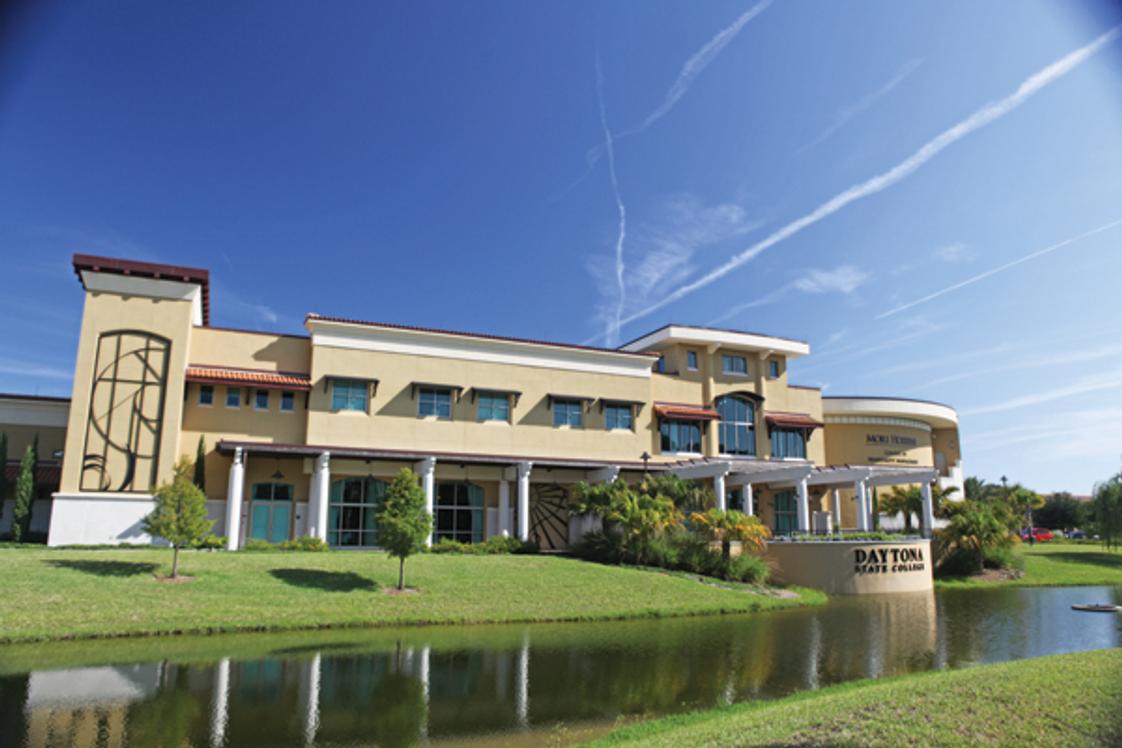- Daytona State College, a comprehensive public college, provides access to a range of flexible programs from community enrichment to the baccalaureate degree, emphasizing student success, embracing excellence and diversity, as well as fostering innovation to enhance teaching and learning.
School Highlights
Daytona State College serves 17,260 students (42% of students are full-time).
The college's student-teacher ratio of 16:1 is lower than the state community college average of 20:1.
Minority enrollment is 45% of the student body (majority Hispanic), which is less than the state average of 67%.
Quick Facts (2025-26)
- Enrollment: 17,260 students
- In-state tuition: $3,306
- Out-state tuition: $12,376
- Student-teacher ratio: 16:1
- Minority enrollment: 45%
- Source: Integrated Postsecondary Education Data System (IPEDS)
Top Rankings
Daytona State College ranks among the top 20% of public schools in Florida for:
Category
Attribute
Community Size
School Overview
The teacher population of 1,049 teachers has stayed relatively flat over five years.
Daytona State College
(FL) Community College Avg.
Carnegie Classification
Baccalaureate/Associate's Colleges: Mixed Baccalaureate/Associate's
Not applicable, not in Carnegie universe (not accredited or nondegree-granting)
Institution Level
Four or more years
At least 2 but less than 4 years
Institution Control
Public
Private, for profit
Total Faculty
1,049 staff
188 staff
School Calendar
Student Body
The student population of Daytona State College has grown by 28% over five years.
The student-teacher ratio of 16:1 has increased from 12:1 over five years.
The Daytona State College diversity score of 0.63 is less than the state average of 0.75. The school's diversity has grown by 13% over five years.
Total Enrollment
17,260 students
1,236 students
Student-Teacher Ratio
16:1
20:1
# Full-Time Students
7,225 students
588 students
# Part-Time Students
10,035 students
648 students
# Enrollment Undergraduate
172 students
282 students
# Full-Time Undergraduate Students
7,225 students
587 students
# Full-Time Graduate Students
n/a
295 students
# Part-Time Undergraduate Students
10,035 students
832 students
# Part-Time Graduate Students
n/a
58 students
Total Dormitory Capacity
n/a
174 students
% American Indian/Alaskan
n/a
n/a
% Asian
3%
5%
% Hispanic
22%
31%
% Black
13%
19%
% White
55%
33%
% Hawaiian
n/a
2%
% Two or more races
5%
4%
% Non Resident races
n/a
3%
% Unknown races
2%
3%
Diversity Score
0.63
0.75
College Completion Rate (Students who graduate in less than 4 years)
n/a
63%
College Completion Rate (Students who graduate in 4 years or more than 4 years)
49%
43%
Average Graduate Earnings (10 Years)
$31,500
$31,500
Tuition and Acceptance Rate
The public in-state tuition of $3,306 is less than the state average of $4,761. The in-state tuition has grown by 6% over four years.
The public out-state tuition of $12,376 is more than the state average of $11,352. The out-state tuition has stayed relatively flat over four years.
In-State Tuition Fees
$3,306
$4,761
Out-State Tuition Fees
$12,376
$11,352
Tuition Notes
$2,055 per semester
% Students Receiving Some Financial Aid
68%
86%
Median Debt for Graduates
$8,560
$9,750
Median Debt for Dropouts
$4,035
$5,500
Acceptance Rate
n/a
94%
SAT Reading
n/a
442
SAT Math
n/a
429
ACT Composite
n/a
18
ACT English
n/a
18
ACT Math
n/a
18
Source: 2024 (or latest year available) Integrated Postsecondary Education Data System (IPEDS) , School Administrators
School Notes
- Daytona State College has a wonderful tradition of providing affordable quality education, small classroom sizes and excellent instructional help. We have a lot to be proud of as an institution and we want to share that pride. We offer more than 75 programs for you to choose from, with classes available days, evenings, weekends, hibrid online & classroom teaching - even via 100% Virtual (on-line)College classes. We offer GED programs, Adult High School programs, Certifications, General Public Courses, Associates and Baccalaureate Degrees. With Six convenient locations in Volusia and Flagler counties, there's certain to be a College campus within minutes of your home, no matter where you live. Daytona State College provides a multitude of technological resources and services to advance its mission. To encourage effective and innovative use of these resources the College also provides in-depth training, technical support, and overall technological guidance and strategic direction. Daytona State College provides a comprehensive library which networks with other state and national libraries to obtain the information you need, when you need it. The Daytona Beach Campus Library also houses the College Computing Commons, a large open lab available to all Daytona State students during library operating hours. This lab provides access to Daytona State academic software, including word processing and spreadsheet applications, as well as the Internet. Daytona State College is governed by a Board of Trustees whose members are appointed by the Governor of the State of Florida. The president of the College and its chief operating officers serve as system-wide administrators.
Frequently Asked Questions
How much does Daytona State College cost?
Daytona State College's tuition is approximately $3,306 for In-State students and $12,376 for Out-State students.
What is Daytona State College's ranking?
Daytona State College ranks among the top 20% of community college in Florida for: Largest student body.
In what neighborhood is Daytona State College located?
Daytona State College is located in the Bel air neighborhood of Daytona Beach, FL.
Recent Articles

Community College Success Rates 2025: Outcomes & Trends
Updated 2025 analysis of community college success rates, completion, transfer, costs, enrollment, and strategies that shape student outcomes.

Community Colleges in 2025: Combating Stereotypes with Impact
Updated insights on how community colleges are dispelling myths, growing enrollment, and expanding pathways in 2025.

2025 FAFSA Changes Explained for Community College Students
A comprehensive guide to 2025 FAFSA changes, what community college students must know, new eligibility rules, timelines, and tips to maximize federal aid.














